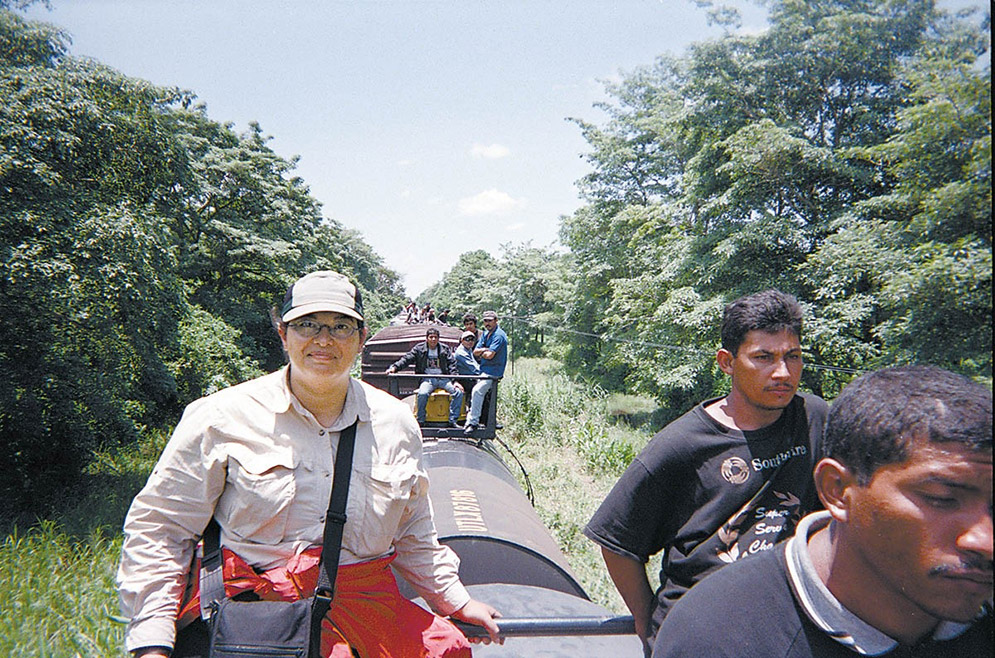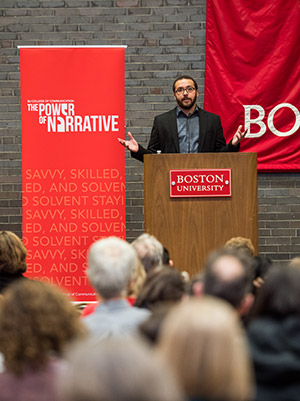COM Power of Narrative Conference: Storytelling in Turbulent Times
Journalists from around the world define—and redefine—their role

Pulitzer-winning journalist Sonia Nazario (left), a keynote speaker at last weekend’s COM Power of Narrative Conference, retraced the deadly journey tens of thousands of children take alone every year through Central America to this country, often atop freight trains, for a Los Angeles Times series. Photo courtesy of Sonia Nazario
Journalist Sonia Nazario never used to get involved in her stories. She saw her role as that of an observer, presenting impartial narratives to readers without intervening in her subjects’ lives. She wrote about schoolchildren so hungry they passed out on the playground, and followed the children of addicts into crack dens, all the while maintaining the journalistic distance required for unbiased reporting. “I focused on people I felt didn’t get enough ink: women, children, poor, Latinos,” and considered her choice of stories a form of activism, she said during a keynote address at the College of Communication Power of Narrative Conference last Saturday. “Sometimes I had to witness people in pain or danger to write the most powerful story that might bring systemic change or reforms.” Still, “some readers were blistering. Was I a reporter or a human being?” she recalled being asked.
It was “Enrique’s Journey,” a six-part Los Angeles Times series that netted her a Pulitzer Prize in 2003, that transformed Nazario into an advocate, and it was the subject of her address. The annual three-day conference brought journalists from across the world to the George Sherman Union, where they shared advice for developing their craft, delved into the complex ethics of investigative journalism, and compared strategies for storytelling in a digital age.
“Enrique’s Journey,” which Nazario expanded into an eponymous bestselling book, centers on 16-year-old Enrique, one of the tens of thousands of children (52,000 in 2014 alone) who journey every year through Mexico to the United States to reunite with mothers who had left them behind in a desperate search for work. Nazario retraced Enrique’s 1,600-mile route from Honduras through Central America and Mexico, often riding atop freight trains. Many of these children are beaten, robbed, and raped by gangsters, who steal—then ransom—the scraps of paper with their mothers’ phone numbers. Children as young as seven leave home to come here, because the alternative is worse, Nazario told the audience. In their own country, they are conscripted into gangs and raped, under the threat of death and the annihilation of everyone they love: “That will tell you everything you need to know about whether a wall will work,” she said.

That wasn’t the weekend’s first—or last—reference to the policies and actions of President Donald J. Trump. The theme of this year’s conference, Telling True Stories in Turbulent Times, was in direct response to the president’s “scornful notion that journalists are ‘the lowest form of life,’” wrote conference founder and codirector Mark Kramer, a COM journalism lecturer and a former COM professor, in his program notes. The day before the conference opened, Trump fired off a tweet at the media for its reporting of alleged ties between his administration and the Russian government: “Just watched the totally biased and fake news reports of the so-called Russia story on NBC and ABC. Such dishonesty!”
“Trump is now the elephant in every room,” no matter your journalistic beat, said Pulitzer-winning journalist and Marshall Project editor-in-chief Bill Keller, another conference keynote speaker. All weekend, presenters and participants shared strategies for understanding all sides of an issue to illuminate truth and defy the label “fake news.”
“Media literacy is more important now than it ever has been,” said conference kickoff speaker Wesley Lowery, a member of the Washington Post team that won a Pulitzer Prize for developing a database to track police shootings. “The reality is that in the polarized climate in which we live, people very often are only receiving news that has been self-segregated to reinforce their beliefs….So there’s a responsibility of news organizations and journalists to be as vigilant as we have ever been, and to spend time engaging with fake news and saying when something is wrong.”
To his readers and to fellow journalists seeking to understand the mentality of a group—whether Black Lives Matter protesters or Trump supporters—Lowery suggested taking the time to meet just one person. “If you can understand one of the protesters, you’re a step closer to understanding 10 of them, and eventually you’ll get to 10,000,” he said.

“Every change we’ve had in this country has come from the bottom,” noted keynote speaker Doris Kearns Goodwin, a presidential scholar, Pulitzer winner for No Ordinary Time: Franklin and Eleanor Roosevelt: The Home Front During World War II, and author of definitive books on Lyndon Johnson, Theodore Roosevelt, and Abraham Lincoln. (Her Team of Rivals: The Political Genius of Abraham Lincoln was the foundation for the Oscar-winning Steven Spielberg (Hon.’09) movie about the 16th president.) Answering the question of whether there is historical precedent for our country’s current divisiveness, Goodwin suggested that “the real echo from the past is the turn of the 20th century. You think about what we’re going through now with globalization and technological revolution—people in rural areas feeling separated from the cities, lots of immigration, lots of anxiety about America changing in ways some people are not happy with—that’s exactly what happened in the turn of the 20th century. During the Industrial Revolution, people moved from farms to cities, you had all sorts of inventions speeding up the pace of life, a lot of immigration, lots of fear of immigrants—and you had demagogues and populists who developed as a result.”
While journalism can be considered the first draft of history, history can help us illuminate the present, said Goodwin, who helped Barack Obama organize a series of dinners with presidential historians during his presidency so he could ask their advice on contemporary issues through the lens of their respective subjects; Goodwin’s involved how Roosevelt and Johnson would have approached the most pressing issues facing the country.
In her keynote, Nazario suggested it’s important for all writers to share their expertise and offer solutions.
“Immigration had never been just a topic for me. I’m the only person in my immediate family born in this country. But at some point after two decades of coverage, on and off, immigration went from something I reported on to something I truly understood in a compelling way….More and more, nonengagement felt like the wrong choice. Keeping silent felt immoral.”
She joined the board of the nonprofit Kids in Need of Defense, which has recruited 14,000 pro-bono lawyers to represent children like Enrique, and began writing opinion pieces.
“I started to think: isn’t that what I got into this gig for in the first place?” she said. “Yes, I am a storyteller. But a storyteller in the service of knowledge that leads to action.” Journalists with expertise in areas like history, criminal justice, education, and addiction are in a position to offer solutions.
“At a certain point, isn’t it immoral not to share what we have come to understand?”
Lara Ehrlich can be reached at lehrlich@bu.edu.

Comments & Discussion
Boston University moderates comments to facilitate an informed, substantive, civil conversation. Abusive, profane, self-promotional, misleading, incoherent or off-topic comments will be rejected. Moderators are staffed during regular business hours (EST) and can only accept comments written in English. Statistics or facts must include a citation or a link to the citation.